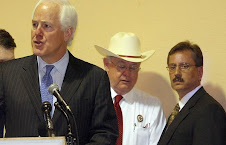Personal Financial Disclosure
In Your State - Texas
Public Service, Personal Gain in Texas
by John Dunbar
WASHINGTON, May 20, 2000 – Between the 1997 and 1999 biennial legislative sessions in Texas, the Senate formed a committee to consider changes in the way the $1 billion a year title insurance industry is regulated.
In Texas, the premiums title companies charge are set by the state. According to the state's insurance consumer advocate, those rates are too high - 15.36 percent too high.
The interim committee issued a report that said little and sparked some minor reforms. It's not surprising. Two of the three members of the committee, Sens. Chris Harris and J.E. "Buster" Brown, have close ties to the title insurance industry.
Title insurance ties
Brown, an attorney, collected between $5,000 and $9,000 from Partners Title Company, and more than $25,000 from Chicago Title Insurance Company, according to his 1998 financial disclosure statement.
Elsewhere in his disclosure, he reports that he represented Allen M. Gentry before the Texas Department of Insurance for fees in excess of $25,000. What he doesn't note is that in 1998, Gentry was senior vice president of New York Stock Exchange-listed Chicago Title.
As for Harris, a lawyer, he estimates his firm receives about 25 percent of its business from a title insurance company. He said the formation of the committee was his idea. He was worried about consumers, he said.
In Texas, there was a trend toward large developers selling land, homes, mortgages and title insurance all in one package. The closed system created no opportunity for consumer involvement, he said.
"Nowhere was there anyone in the process to tell them (home buyers) if they were getting the house at a competitive price per square foot," he said.
Harris, who does business for an independent title company, said he was approached to provide legal services to one of the large development firms.
"Hell no"
"What brought my attention to it was a couple of those big companies saying they wanted to include me in that type of operation," he said. "And I told them not only no, but hell no."
Since Harris does not work for one of the larger firms, logic would seem to indicate Harris formed the select committee to protect his own interest. But he said that is not the case.
"No, In fact they (large developers) offered to bring me business. No, my business has always been very stable," he said. "We go back 45 years."
The close relationship Brown and Harris have with the title insurance commission bothers at least one government watchdog.
"It violates two basic principles of conflict of interest. One is that one should never be in a position to make legislative decisions that affect his or her own business, or secondly you should never be in a position of making decisions about your large clients," said Tom "Smitty" Smith, director of Public Citizen of Texas.
"We have long advocated for legislation that sets some limits that would require recusal of legislators if it (the legislation) affected more than 10 percent of their personal assets or $25,000 worth of their personal assets," he continued.
Harris and Brown are in the business of giving advice, legal and otherwise. That is not at all unusual in the Texas Legislature. The Center's database reports half of the lawmakers in office in 1998 reported financial ties to the legal or consulting fields.
Lawyers abound
At least 57 legislators worked as lawyers while in office in 1998, according to the Center's database. In addition, at least 20 more lawmakers list their business as "consulting." They are none too shy about giving their advice concerning matters that are the subject of legislation they may be working on.
According to the Texas constitution and ethics code, a lawmaker may not vote on legislation that will directly affect an entity in which he or she has a controlling interest, unless the legislation affects an entire class of businesses.
The lawmaker should disclose that interest and refrain from voting on the bill.
Lawmakers, not just in Texas but throughout the nation's state legislatures, often vote on legislation that affects their industry, but it is rare to find a vote affecting a specific business.
So there is no prohibition on Brown and Harris recommending legislation that affects the title insurance industry in general.
"It's my belief we're supposed to take our life experiences as we encounter them and take them to Austin and use our experiences accordingly," Harris said. Legislators may work in their own field on a law, "as long as it doesn't benefit us more than anyone else."
Low paid legislators
Texas's legislature meets every other year, despite the size and population of the state. Its members are among the lowest paid in the nation, with an annual salary of $7,200.
The state has relatively strong disclosure rules regarding its lawmakers. Texas ranked sixth in the nation for making basic information on state legislators' private income available to the public, according to a survey by the Center for Public Integrity.
The laws give citizens an important weapon in determining where their representatives' and senators' interests lie.
Texas, along with Wisconsin, received 88 of a possible 100 points. Texas requires information on legislators' employment relationships, officer/director positions, investments, real-property holdings and client and family name information.
Texas also requires lawmakers to disclose income from firms that lobby the legislature, which is how the Center found out about Sen. Brown.
Brown did not return several calls to his law office and legislative office seeking comment.
Subscribe to:
Post Comments (Atom)







No comments:
Post a Comment